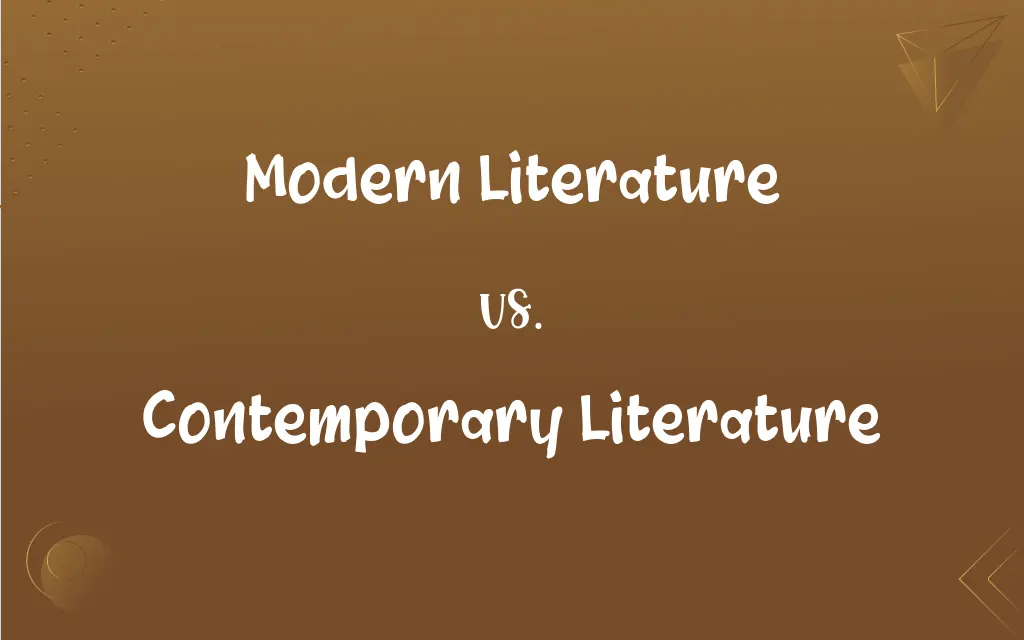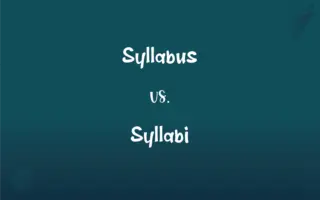Modern Literature vs. Contemporary Literature: What's the Difference?
Edited by Aimie Carlson || By Janet White || Published on January 19, 2024
Modern literature refers to works from the late 19th and early 20th centuries, focusing on themes of disillusionment, while contemporary literature is literature written from the mid-20th century to the present, reflecting current themes and issues.

Key Differences
Modern literature emerged in the late 19th and early 20th centuries, characterized by a break from traditional forms and subjects. Contemporary literature, beginning in the mid-20th century, focuses on current themes and often addresses social and political issues of its time.
The modernist movement in literature was marked by experimentation with narrative techniques and a focus on the inner self. In contrast, contemporary literature often embraces a more diverse range of perspectives and is noted for its engagement with global and multicultural issues.
Modern literature often reflects the disillusionment of the post-World War I era, exploring themes of alienation and fragmentation. Contemporary literature tends to be more inclusive in terms of subject matter, representing a wide array of experiences and identities.
Key figures in modern literature include James Joyce, Virginia Woolf, and T.S. Eliot, who were known for their innovative styles. Contemporary literature boasts authors like Toni Morrison and Haruki Murakami, whose works often explore postmodern themes.
Modern literature frequently questioned the nature of reality and perception, using stream of consciousness and other techniques. Contemporary literature tends to be more accessible and often incorporates technology and modern societal issues.
ADVERTISEMENT
Comparison Chart
Time Period
Late 19th to early 20th century
Mid-20th century to present
Themes
Disillusionment, existentialism
Current issues, diversity, globalization
Narrative Style
Experimental, stream of consciousness
Diverse, often more accessible
Key Authors
James Joyce, Virginia Woolf
Toni Morrison, Haruki Murakami
Representation
Focus on inner self, existential crises
Broad representation of experiences, identities
ADVERTISEMENT
Modern Literature and Contemporary Literature Definitions
Modern Literature
Characterized by experimental narrative techniques.
The stream of consciousness in modern literature altered how stories are told.
Contemporary Literature
Often addresses social and political issues.
Contemporary literature frequently explores themes of identity and culture.
Modern Literature
Break from traditional forms and subjects.
Modern literature revolutionized poetic forms, as seen in T.S. Eliot's works.
Contemporary Literature
Reflects current themes and global issues.
Contemporary literature often deals with issues like globalization and technology.
Modern Literature
Focuses on the inner self and consciousness.
The exploration of inner thoughts in modern literature was groundbreaking.
Contemporary Literature
Incorporates modern societal issues and technology.
The impact of the internet is a recurring theme in contemporary literature.
Modern Literature
Literature from the late 19th to early 20th century.
James Joyce's Ulysses is a seminal work of modern literature.
Contemporary Literature
Embraces a diverse range of perspectives.
The inclusion of diverse voices is a hallmark of contemporary literature.
Modern Literature
Reflects themes of disillusionment and fragmentation.
Modern literature often portrays the alienation of individuals in society.
Contemporary Literature
Literature from the mid-20th century to present.
Contemporary literature includes works like The Bluest Eye by Toni Morrison.
FAQs
What themes are common in contemporary literature?
Identity, culture, and technology are frequent themes in contemporary literature.
How did modern literature change narrative techniques?
It introduced experimental styles like stream of consciousness.
What are characteristics of contemporary literature?
Contemporary literature often reflects current societal issues and diverse perspectives.
Who are some famous modern literature authors?
James Joyce and Virginia Woolf are notable figures in modern literature.
What period does contemporary literature cover?
It spans from the mid-20th century to the present.
Can a work be both modern and contemporary?
No, they are distinct periods with different characteristics.
How do modern and contemporary literature differ in themes?
Modern literature often focuses on disillusionment, while contemporary literature addresses more varied and current issues.
Do contemporary authors use technology in their storytelling?
Yes, contemporary literature often includes digital and media elements.
What defines modern literature?
Modern literature is known for its experimental forms and exploration of existential themes.
Are there specific genres in contemporary literature?
It spans various genres, reflecting its diversity.
Is contemporary literature more diverse than modern literature?
Yes, it tends to include a wider range of voices and perspectives.
Did modern literature influence contemporary literature?
Yes, modernism laid the groundwork for many contemporary literary techniques and themes.
What role does identity play in contemporary literature?
Exploring personal and cultural identities is a central theme.
What period does modern literature cover?
It typically covers the late 19th to early 20th century.
What impact did World War I have on modern literature?
It led to a sense of disillusionment and questioning, greatly influencing themes.
How did modern literature respond to industrialization?
It often critiqued or reflected the disconnection and alienation caused by industrialization.
Does contemporary literature engage with social issues?
Yes, it frequently addresses social and political themes relevant to current times.
How is the narrative style different in modern literature?
Modern literature often employed disjointed and non-linear narratives.
Can contemporary literature be experimental?
Yes, many contemporary authors experiment with form and style.
How does contemporary literature reflect globalization?
It incorporates themes of cultural exchange, migration, and global conflicts.
About Author
Written by
Janet WhiteJanet White has been an esteemed writer and blogger for Difference Wiki. Holding a Master's degree in Science and Medical Journalism from the prestigious Boston University, she has consistently demonstrated her expertise and passion for her field. When she's not immersed in her work, Janet relishes her time exercising, delving into a good book, and cherishing moments with friends and family.
Edited by
Aimie CarlsonAimie Carlson, holding a master's degree in English literature, is a fervent English language enthusiast. She lends her writing talents to Difference Wiki, a prominent website that specializes in comparisons, offering readers insightful analyses that both captivate and inform.






































































